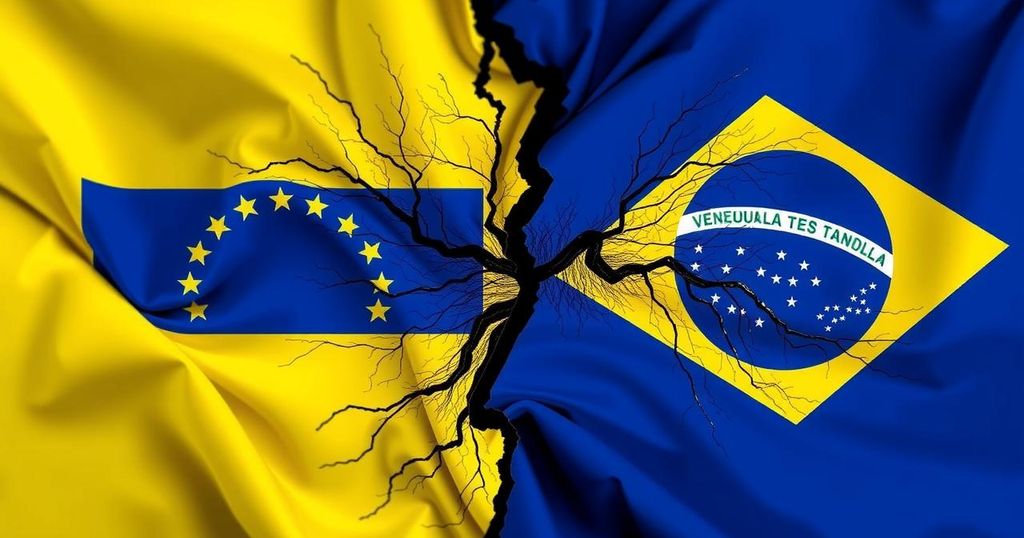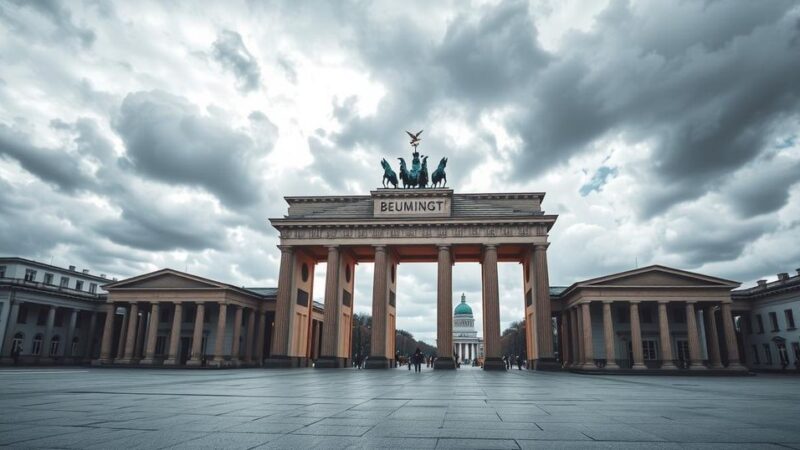Relations between Venezuela and Brazil have rapidly deteriorated following the rejection of Venezuela’s application to join the BRICS bloc. Venezuelan officials criticized Brazil’s government, claiming interference due to US interests, which prompted Venezuela to recall its ambassador and summon Brazil’s diplomat. The situation traces back to concerns over Venezuela’s legitimacy post the disputed July election and Brazil’s evaluation of potential new BRICS members.
Relations between Venezuela and Brazil have soured significantly after Venezuelan President Nicolas Maduro’s aspirations to join the BRICS bloc of emerging market nations were thwarted by Brazil. A close ally of Maduro publicly criticized a key aide to Brazilian President Luiz Inacio Lula da Silva, claiming he was representing US interests and would be labeled persona non grata by the Venezuelan legislature. In response, the Venezuelan foreign ministry announced the recall of its ambassador from Brasília and summoned Brazil’s chargé d’affaires for reprimanding, as Lula’s ambassador was unavailable due to vacation. President Lula, who was absent from the recent summit in Kazan, Russia, due to a head injury, has not made any public comments regarding the escalating tensions. Meanwhile, Celso Amorim, Lula’s chief foreign policy adviser, informed lawmakers that Venezuela’s exclusion from BRICS expansion stemmed from concerns regarding its regional reputation after the disputed presidential election in July. Jorge Rodriguez, President of Venezuela’s National Assembly, accused Amorim of acting maliciously, likening his behavior to that of a representative for the US government rather than a neutral mediator. Amorim defended Brazil’s position, stating that prospective BRICS members must wield international influence and represent their regions adequately, criteria he contended Venezuela does not fulfill. Maduro, claiming victory in the aforementioned election without presenting substantive evidence, had anticipated joining BRICS alongside Latin American countries such as Cuba and Bolivia. Following the denial of membership, the Venezuelan government openly blamed Brazil for vetoing its accession, despite claims of support from other BRICS members. This has led to sharp criticisms from Maduro and his administration directed at Brazilian officials, describing the veto as a betrayal. Maduro asserted, “No one shuts Venezuela up or vetoes it,” during his address on television, insisting that he would await Lula’s informed response to the situation. Amorim characterized Venezuela’s reaction as “totally disproportionate” but refrained from commenting on the latest developments. The ongoing conflict follows unsuccessful mediation attempts from Lula and Colombian President Gustavo Petro in the aftermath of the disputed election, with Lula adopting a more critical view of Maduro’s government in recent months. Though Venezuela’s electoral authority claims Maduro secured a narrow victory, opposition sources contest these claims, suggesting extensive electoral irregularities. Opposition candidate Edmundo Gonzalez reportedly secured a far greater share of the vote and has subsequently fled to Spain, while fellow opposition leader Maria Corina Machado remains threatened with arrest in Venezuela.
The diplomatic relationship between Venezuela and Brazil has become increasingly strained, particularly following Venezuela’s efforts to join the BRICS bloc. This situation is compounded by the internal political turmoil in Venezuela, where the legitimacy of President Nicolas Maduro’s electoral victory is contested domestically and internationally, which has implications for his country’s standing in regional affairs. Brazil’s government, under President Luiz Inacio Lula da Silva, has taken a critical position concerning Maduro’s administration, especially in light of new developments in Venezuelan electoral conduct and the opposition’s claims of electoral fraud. As Venezuela seeks to assert its international presence, this diplomatic rift underscores broader geopolitical tensions in Latin America.
In conclusion, the deteriorating relations between Venezuela and Brazil highlight the complexities of regional diplomacy, particularly in the context of electoral legitimacy and international alliances. The rejection of Venezuela’s BRICS membership application has exacerbated an already tense situation, drawing sharp responses from Maduro’s government and criticisms directed towards Brazilian officials. The outcome of this conflict will likely influence the broader political landscape in Latin America, as both nations navigate their respective positions in the international arena while managing internal challenges and regional dynamics.
Original Source: www.livemint.com





